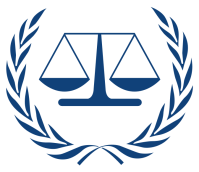
International Criminal Court shield
After many weeks of speculation and veiled threats-by-extension from Western government leaders, the prosecutor of the International Criminal Court announced on Monday that he is seeking arrest warrants for Muammar Qaddafi, his son Seif al-Islam Qaddafi and his brother-in-law Abdullah al-Sanousi for systematically targeting citizens in Libya’s ongoing protests and civil strife. Libya isn’t a signatory to the ICC treaty, and prosecutor Luis Moreno-Ocampo declared that the Libyan people should take it upon themselves to make the arrests, if warrants are granted. Moreno-Ocampo said he had enough evidence to go to trial immediately, just another sign that the Qaddafi clan has crossed a line that disallows their staying in power – as far as the West is concerned.
Here’s the continental pattern reinforced by the presumably looming indictments: if the request is granted by an ICC judges’ panel, these will constitute arrest warrants #24-26 for the ICC – all of them being African. To date the ICC has indicted 5 Ugandans, 5 from the Democratic Republic of Congo, 1 from the Central African Republic, 6 Sudanese (over Darfur), and 6 Kenyans. So far four of the 23 are currently on trial, 9 are pre-trial, 7 are fugitives and 1 is deceased. Only 5 of the indictees are actually held in ICC custody at this time. The most famous fugitive is Omar al-Bashir, president of (now just north) Sudan.
I first wrote about an “A-to-Z rule set for processing politically bankrupt states” in my 2005 book, “Blueprint for Action: A Future Worth Creating.” From my blog’s glossary, I list the six steps of the rule set as:
- UN Security Council indicts;
- G-20, acting as functioning executive, unleashes the Leviathan and finances reconstruction;
- Leviathan intervenes;
- SysAdmin stabilizes and begins nation-building;
- International Reconstruction Fund oversees rebuild; and
- International Criminal Court adjudicates identified war criminals.
We got the up-front “indictments” – in so many words – from the UNSC, NATO, the Arab League and the African Union, all of whom basically came down on the side of a no-fly-zone. Nothing so unified as a G-20-level okay, so NATO itself plays functioning executive, like it did pro-actively in the Balkans in the 1990s. US military plays lead early on, fulfilling its Leviathan role in the lightest manner possible (so very Obama), but then Washington lets its European allies step to the front. As the fighting drags on, we’ve seen the beginning of relief efforts (the purview of the “second-half” force I dub the System Administrator), but not much more for obvious reasons. What nation-building that’s occurred has been bottom-up and spontaneous on the part of the rebels in the west, and so far it’s been pretty decent in its execution and stated ambitions. No passing-the-hat donor conference yet, but with the ICC moving, we now have pretty much the alpha and omega in place: UNSC resolution up front and ICC indictments forthcoming on the back end.
As for the geographic concentration in Africa, there’s little surprise to be found there: a lot of fake states being remapped by globalization’s advance, and when that happens, straight lines (drawn by colonialists) are made squiggly again through force/”ethnic cleansing”/etc. And with local governments either being too weak to stop the violence or perpetrating it themselves, we see the ICC step in – time and again – to do for Africa what Africa is yet unable to do for itself. This is your global governance at work, my friends.
Expect this pattern to continue, but note the disconnect: the West polices and the East invests. That’s why I wanted something on the order of G-20 buy-in in the first place: this is not tenable on a strategic basis even as the division of labor makes some sense – for now. Obviously, the East (specifically China) needs to start paying its way and stop the de facto free-riding. Ultimate point being, the West and East must eventually come to some understanding on this historical process of frontier integration amidst globalization’s advance. Collectively we have the resources and the willpower. We simply remain disorganized in our approach – by choice.


